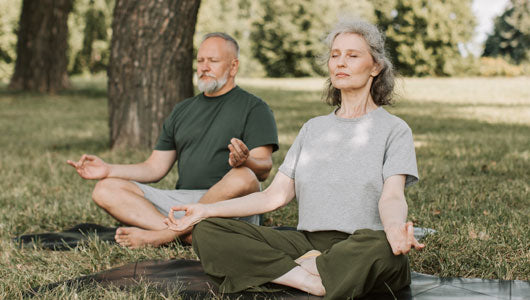
Self-Care Trends and Statistics
The term "self-care" is everywhere, from news articles to books to podcasts. Several years ago the notion of self-care began to appear with increasing frequency in social media and Internet searches, and is becoming more and more popular.
What does the self-care trend mean, and how long will it last? Is it just a flash in the pan, or a genuine awakening in the social psyche? Let's look at some recent statistics to understand the growing popularity of self-care, and how it's likely to trend going forward.
What Is Self-Care?
Before we look at self-care as a social trend, let's define what self-care means. Self-care applies to many parts of our lives, including our physical health, finances, emotions, and relationships. It requires being engaged with ourselves, aware of our emotions, and focused on meeting our own needs.
Self-care isn't a one-size-fits-all strategy that works the same for everyone. It involves knowing ourselves so we can learn the strategies that work for us. Self-care for one person may mean cooking healthy food at home, while for another it might mean being more adventurous with food and eating out more often.
Self-care is not a single action, but a way of living that means being more present and aware of ourselves. It can be challenging to reserve time and energy for continuing self-care, particularly if we're busy with careers and family. Many of us are accustomed to ignoring our own needs to take care of others, and find it difficult to say no. Self-care is a call to prioritize ourselves, too, and not sacrifice our own happiness.
Is Self-Care Just A Trend?
The popularity of self-care can make it appear to be a trend, when in fact it may represent a larger societal awakening. The topics of mental health, identity, therapy, and self-improvement seem to indicate a shift in attitudes toward greater openness and exploration of ourselves.
This change has been happening slowly over decades, and has accelerated in recent years. We are seeing an increase in public discussion about these issues, and people are talking more openly about their struggles with depression, anxiety, trauma, and other emotional challenges.
This shift also coincides with a growing awareness of the importance of taking care of our bodies and wellness in general. Like healthy eating, exercise, and concern for the environment, self-care appears to be less a trend and more a growth in awareness that is likely to grow over time.
Self-Care By The Numbers
In 7 years, the self care industry increased in value from $10 billion to $450 billion. Consumers spend a larger proportion of their household budget each year on products designed specifically to improve their lives. And while there are many different types of self-care, some of the most popular include exercise, healthy eating, and relaxation.
Let's look at some of the latest self-care statistics:
- Almost nine in ten Americans say they practice self-care regularly
- 44% of millenials practice self-care
- 57% of baby boomers practice self-care
- 72% of Gen Zers say that mental health and stress are their top self-care concerns
- 5.3% of global economic output is generated by the health and self-care industries
- 79% of US employers offer a wellness program to help promote self-care
- 75% of Americans surveyed said that personal wellness, including emotional wellbeing, is a never-ending goal
- 42% of Americans say they value experiences over personal possessions
- Google searches for self-care products have gone up 250% since 2014
The evidence is clear: people increasingly value experiences and purchases that contribute to their mental, emotional, and physical health, and are gradually moving away from buying material goods unrelated to self-care.
Concern for the environment and anxiety associated with the climate, Covid-19 pandemic, and income inequality are also contributing to the urgency for self-care, particularly among people from the Millennial and Gen Z generations.
Self-Care By Population
Self-care is unique to each person, but can have some similarities depending on age, profession, gender, and interests. Self-care for healthcare workers has been a particular topic of discussion since early 2020 when the Covid-19 pandemic began in the United States.
Overwork, burnout, PTSD, and the fear of exposure have made self-care difficult for many healthcare workers, who are leaving the profession in unprecedented numbers. Leaving the profession is a form of self-care for some healthcare workers, particularly those who have worked in overwhelmed hospitals since the beginning of the pandemic.
Self-care in healthcare may also mean more time off, access to mental health resources, and greater government assistance to make sure staffing is adequate and healthcare workers have the resources they need.
Gen Zers and Millennials are typically more comfortable expressing the need for self-care than older generations. They are more likely to describe the impact on their mental and emotional health by climate change, racism, social divisions, politics, and social media. Self-care for them may involve becoming more politically aware and involved and working for causes they believe in. Though many people associate the term "self-care" with rest and relaxation, for others it may mean greater activism.
Older people may be less familiar with self-care terms, but research shows they're becoming more comfortable with the practice of self-care. From remaining fit into old age, experiencing adventure travel, taking time to rest, and making investments in companies that reflect their values, older people are practicing self-care in ways their parents' generation did not.
Covid-19 has had the unintended consequence of reminding people of all ages that self-care matters. Illness, fear, isolation, and the passing of millions of people worldwide have made many of us more aware of the value of mental and physical well-being, and how crucial self-care is to our health and happiness.
Will The Self-Care Trend Last?
Self-care appears to be less a trend than a lifestyle, a cultural shift toward well-being in all aspects of our lives. Whereas looking after our mental and emotional health may have once seemed out of the ordinary, it is now not only accepted but expected among a large percentage of the American population.
In addition, an industry has sprung up around self-care, making it more likely that the message of emotional, mental, sexual, and financial health will continue, encouraging increasing numbers of people to adopt behaviors that nurture the self.
